Organizational Behavior and Culture: A Report on JD Sports' Practices
VerifiedAdded on 2023/01/05
|11
|3268
|78
Report
AI Summary
This report examines the organizational behavior and culture of JD Sports, a British sports fashion retail company. It identifies JD Sports' culture using Handy's culture model, specifically focusing on the role culture, and explores how this culture improves organizational effectiveness through effective communication, utilizing Berlo's communication model. The report also evaluates the role of culture on employee motivation, referencing Maslow's hierarchy of needs, and assesses how JD Sports could leverage its culture to enhance success. The analysis covers various aspects, including task, power, role, and person cultures, and their impact on individual and team behavior, as well as the importance of effective communication channels in fostering organizational effectiveness and employee engagement. The report highlights the significance of understanding employee needs and motivations to drive productivity and profitability, emphasizing the importance of adapting organizational practices to align with cultural values.
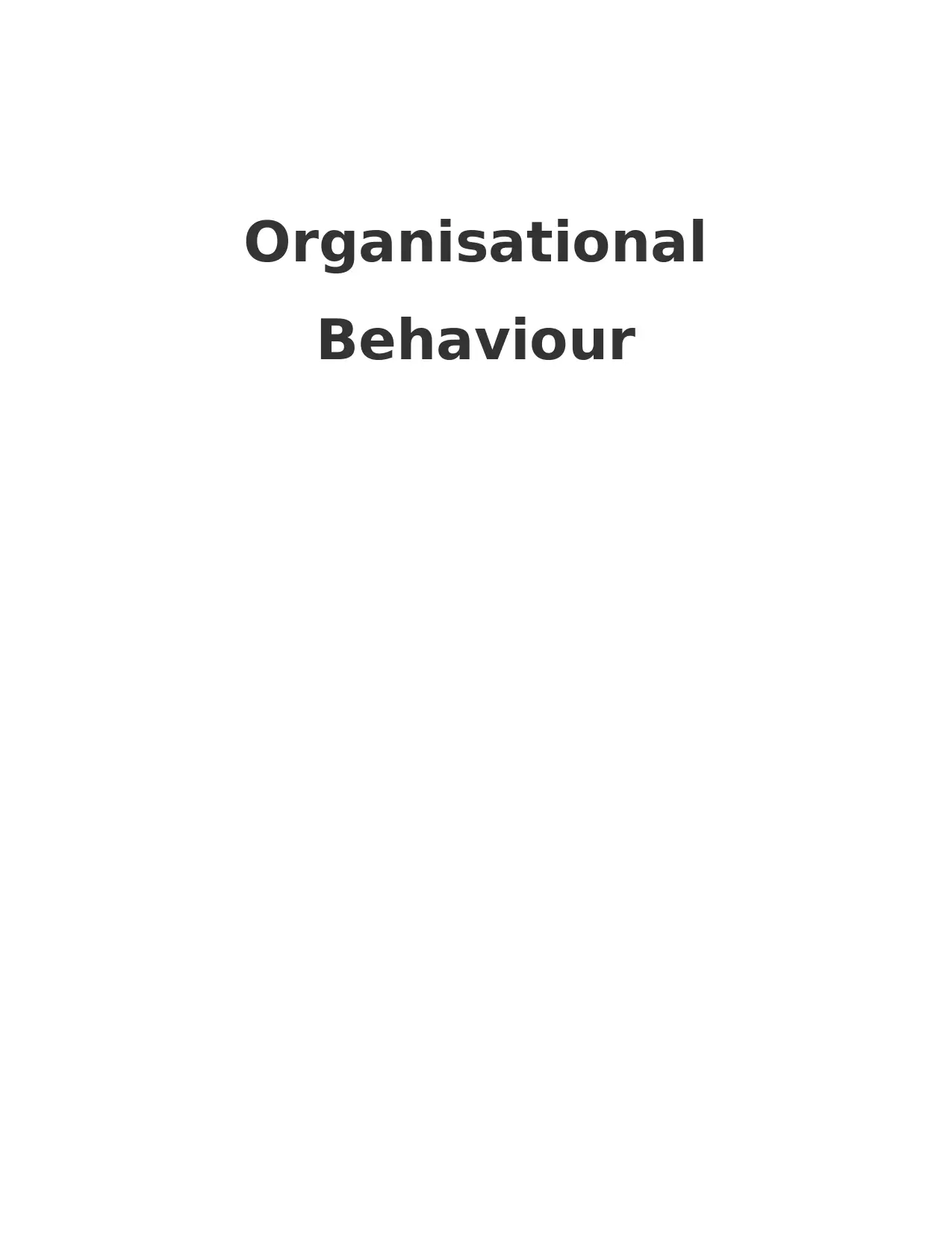
Organisational
Behaviour
Behaviour
Paraphrase This Document
Need a fresh take? Get an instant paraphrase of this document with our AI Paraphraser
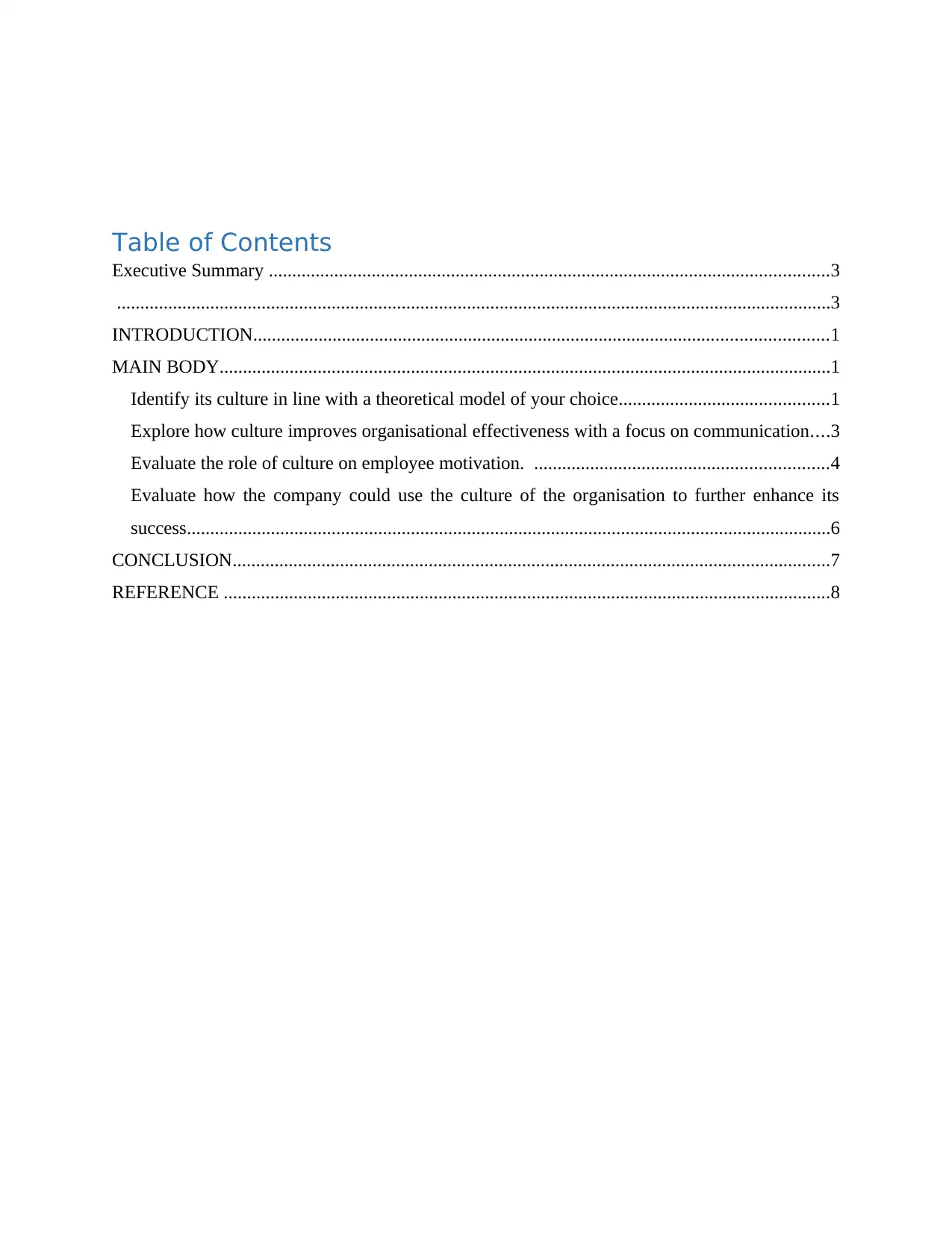
Table of Contents
Executive Summary ........................................................................................................................3
.........................................................................................................................................................3
INTRODUCTION...........................................................................................................................1
MAIN BODY...................................................................................................................................1
Identify its culture in line with a theoretical model of your choice.............................................1
Explore how culture improves organisational effectiveness with a focus on communication....3
Evaluate the role of culture on employee motivation. ...............................................................4
Evaluate how the company could use the culture of the organisation to further enhance its
success..........................................................................................................................................6
CONCLUSION................................................................................................................................7
REFERENCE ..................................................................................................................................8
Executive Summary ........................................................................................................................3
.........................................................................................................................................................3
INTRODUCTION...........................................................................................................................1
MAIN BODY...................................................................................................................................1
Identify its culture in line with a theoretical model of your choice.............................................1
Explore how culture improves organisational effectiveness with a focus on communication....3
Evaluate the role of culture on employee motivation. ...............................................................4
Evaluate how the company could use the culture of the organisation to further enhance its
success..........................................................................................................................................6
CONCLUSION................................................................................................................................7
REFERENCE ..................................................................................................................................8
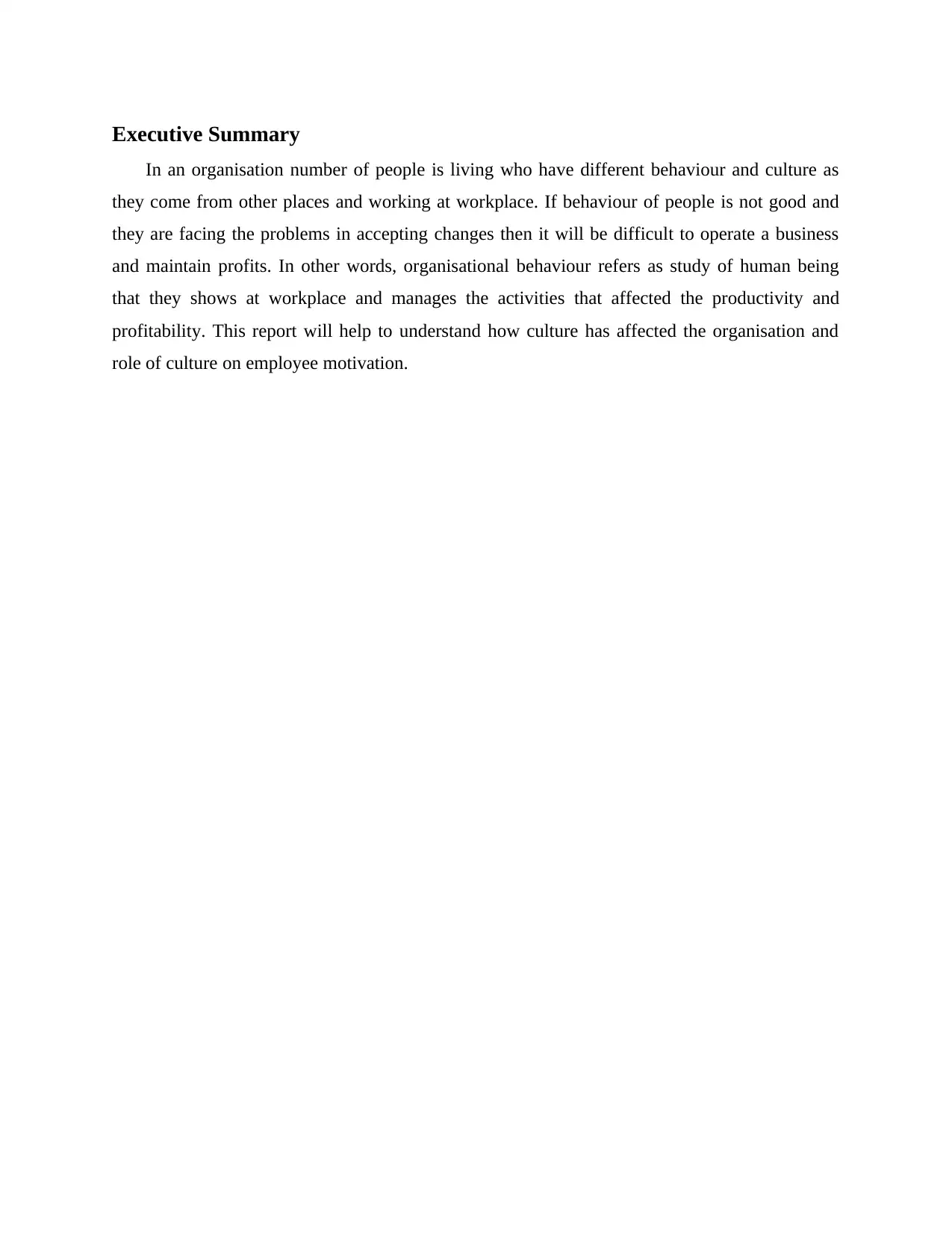
Executive Summary
In an organisation number of people is living who have different behaviour and culture as
they come from other places and working at workplace. If behaviour of people is not good and
they are facing the problems in accepting changes then it will be difficult to operate a business
and maintain profits. In other words, organisational behaviour refers as study of human being
that they shows at workplace and manages the activities that affected the productivity and
profitability. This report will help to understand how culture has affected the organisation and
role of culture on employee motivation.
In an organisation number of people is living who have different behaviour and culture as
they come from other places and working at workplace. If behaviour of people is not good and
they are facing the problems in accepting changes then it will be difficult to operate a business
and maintain profits. In other words, organisational behaviour refers as study of human being
that they shows at workplace and manages the activities that affected the productivity and
profitability. This report will help to understand how culture has affected the organisation and
role of culture on employee motivation.
⊘ This is a preview!⊘
Do you want full access?
Subscribe today to unlock all pages.

Trusted by 1+ million students worldwide
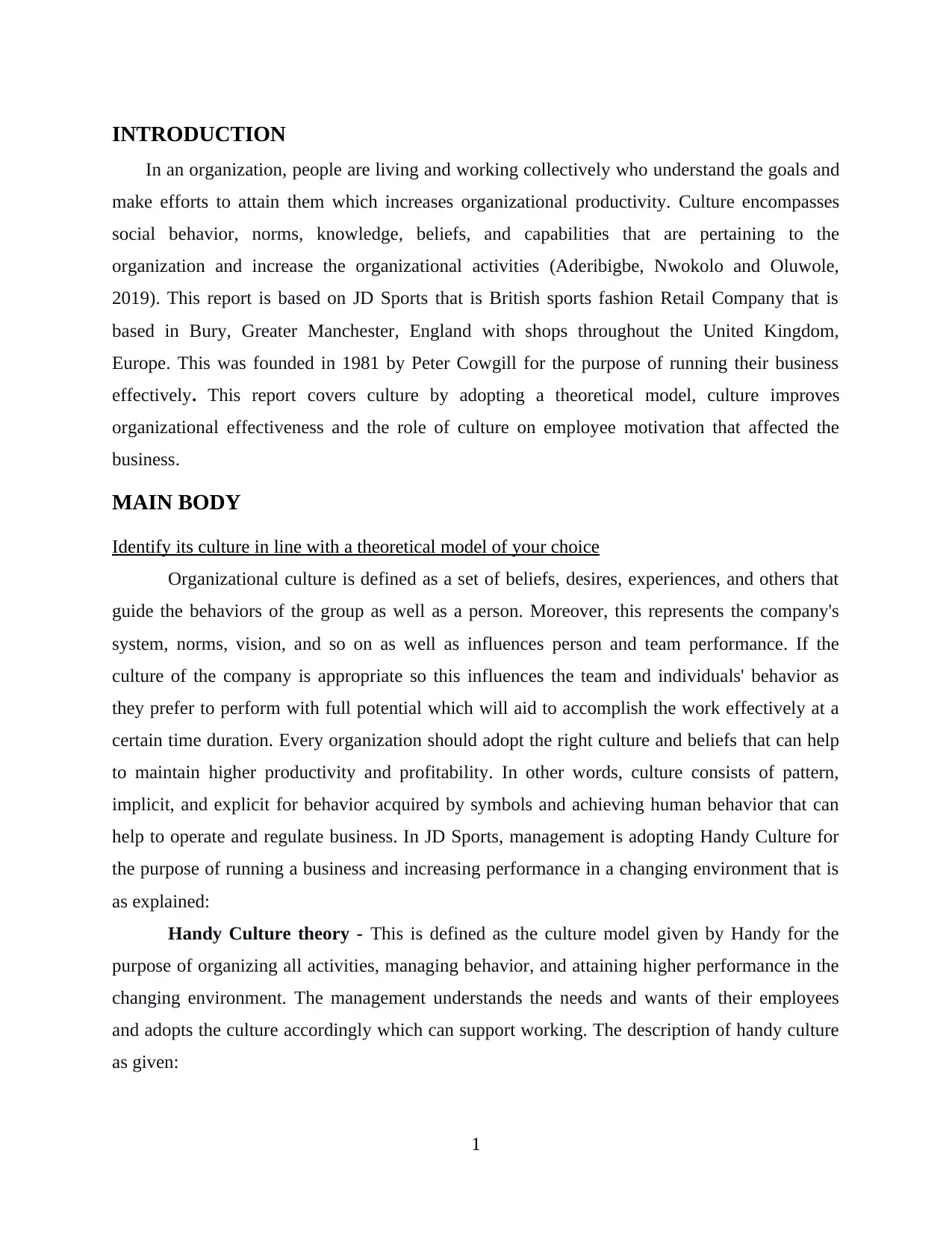
INTRODUCTION
In an organization, people are living and working collectively who understand the goals and
make efforts to attain them which increases organizational productivity. Culture encompasses
social behavior, norms, knowledge, beliefs, and capabilities that are pertaining to the
organization and increase the organizational activities (Aderibigbe, Nwokolo and Oluwole,
2019). This report is based on JD Sports that is British sports fashion Retail Company that is
based in Bury, Greater Manchester, England with shops throughout the United Kingdom,
Europe. This was founded in 1981 by Peter Cowgill for the purpose of running their business
effectively. This report covers culture by adopting a theoretical model, culture improves
organizational effectiveness and the role of culture on employee motivation that affected the
business.
MAIN BODY
Identify its culture in line with a theoretical model of your choice
Organizational culture is defined as a set of beliefs, desires, experiences, and others that
guide the behaviors of the group as well as a person. Moreover, this represents the company's
system, norms, vision, and so on as well as influences person and team performance. If the
culture of the company is appropriate so this influences the team and individuals' behavior as
they prefer to perform with full potential which will aid to accomplish the work effectively at a
certain time duration. Every organization should adopt the right culture and beliefs that can help
to maintain higher productivity and profitability. In other words, culture consists of pattern,
implicit, and explicit for behavior acquired by symbols and achieving human behavior that can
help to operate and regulate business. In JD Sports, management is adopting Handy Culture for
the purpose of running a business and increasing performance in a changing environment that is
as explained:
Handy Culture theory - This is defined as the culture model given by Handy for the
purpose of organizing all activities, managing behavior, and attaining higher performance in the
changing environment. The management understands the needs and wants of their employees
and adopts the culture accordingly which can support working. The description of handy culture
as given:
1
In an organization, people are living and working collectively who understand the goals and
make efforts to attain them which increases organizational productivity. Culture encompasses
social behavior, norms, knowledge, beliefs, and capabilities that are pertaining to the
organization and increase the organizational activities (Aderibigbe, Nwokolo and Oluwole,
2019). This report is based on JD Sports that is British sports fashion Retail Company that is
based in Bury, Greater Manchester, England with shops throughout the United Kingdom,
Europe. This was founded in 1981 by Peter Cowgill for the purpose of running their business
effectively. This report covers culture by adopting a theoretical model, culture improves
organizational effectiveness and the role of culture on employee motivation that affected the
business.
MAIN BODY
Identify its culture in line with a theoretical model of your choice
Organizational culture is defined as a set of beliefs, desires, experiences, and others that
guide the behaviors of the group as well as a person. Moreover, this represents the company's
system, norms, vision, and so on as well as influences person and team performance. If the
culture of the company is appropriate so this influences the team and individuals' behavior as
they prefer to perform with full potential which will aid to accomplish the work effectively at a
certain time duration. Every organization should adopt the right culture and beliefs that can help
to maintain higher productivity and profitability. In other words, culture consists of pattern,
implicit, and explicit for behavior acquired by symbols and achieving human behavior that can
help to operate and regulate business. In JD Sports, management is adopting Handy Culture for
the purpose of running a business and increasing performance in a changing environment that is
as explained:
Handy Culture theory - This is defined as the culture model given by Handy for the
purpose of organizing all activities, managing behavior, and attaining higher performance in the
changing environment. The management understands the needs and wants of their employees
and adopts the culture accordingly which can support working. The description of handy culture
as given:
1
Paraphrase This Document
Need a fresh take? Get an instant paraphrase of this document with our AI Paraphraser
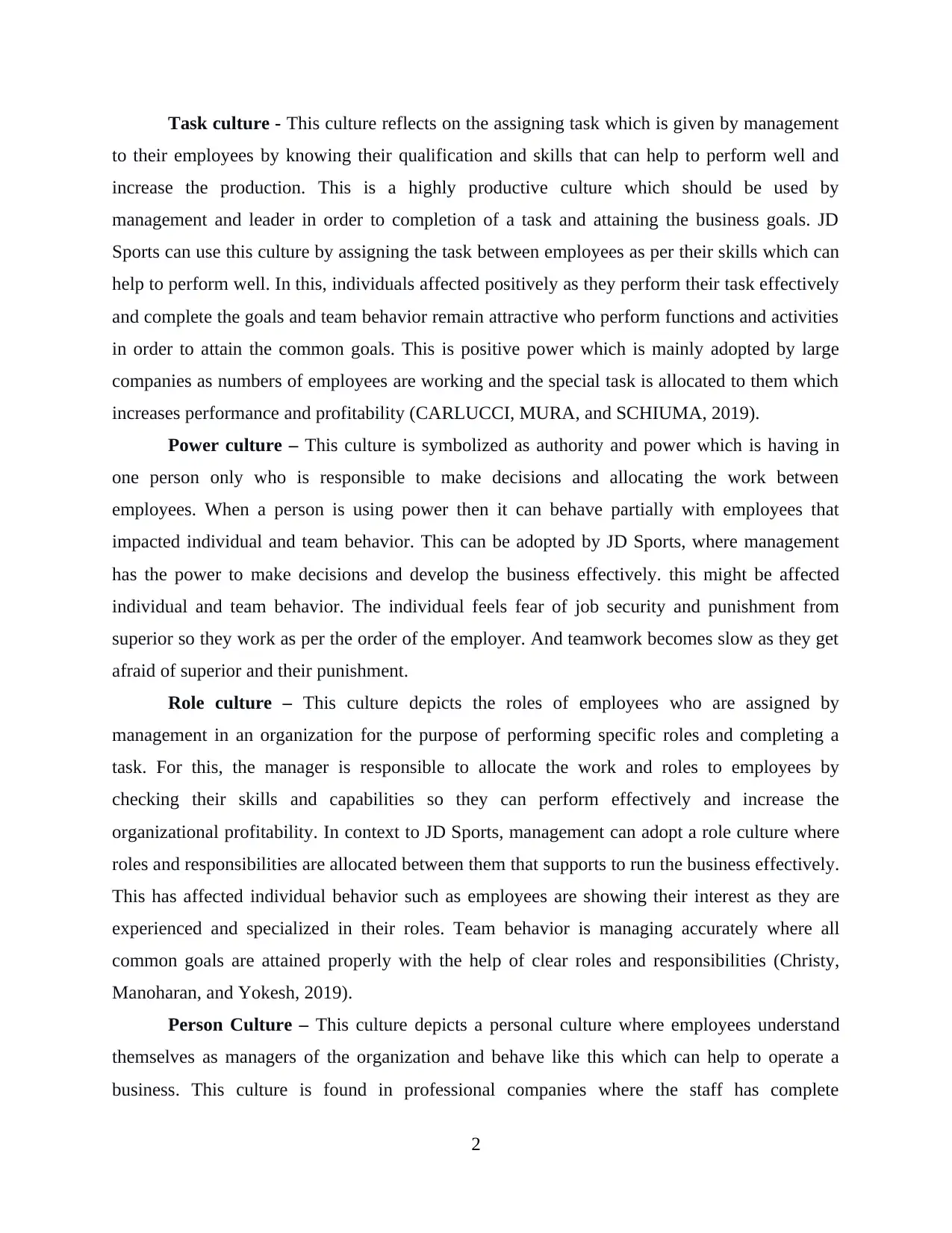
Task culture - This culture reflects on the assigning task which is given by management
to their employees by knowing their qualification and skills that can help to perform well and
increase the production. This is a highly productive culture which should be used by
management and leader in order to completion of a task and attaining the business goals. JD
Sports can use this culture by assigning the task between employees as per their skills which can
help to perform well. In this, individuals affected positively as they perform their task effectively
and complete the goals and team behavior remain attractive who perform functions and activities
in order to attain the common goals. This is positive power which is mainly adopted by large
companies as numbers of employees are working and the special task is allocated to them which
increases performance and profitability (CARLUCCI, MURA, and SCHIUMA, 2019).
Power culture – This culture is symbolized as authority and power which is having in
one person only who is responsible to make decisions and allocating the work between
employees. When a person is using power then it can behave partially with employees that
impacted individual and team behavior. This can be adopted by JD Sports, where management
has the power to make decisions and develop the business effectively. this might be affected
individual and team behavior. The individual feels fear of job security and punishment from
superior so they work as per the order of the employer. And teamwork becomes slow as they get
afraid of superior and their punishment.
Role culture – This culture depicts the roles of employees who are assigned by
management in an organization for the purpose of performing specific roles and completing a
task. For this, the manager is responsible to allocate the work and roles to employees by
checking their skills and capabilities so they can perform effectively and increase the
organizational profitability. In context to JD Sports, management can adopt a role culture where
roles and responsibilities are allocated between them that supports to run the business effectively.
This has affected individual behavior such as employees are showing their interest as they are
experienced and specialized in their roles. Team behavior is managing accurately where all
common goals are attained properly with the help of clear roles and responsibilities (Christy,
Manoharan, and Yokesh, 2019).
Person Culture – This culture depicts a personal culture where employees understand
themselves as managers of the organization and behave like this which can help to operate a
business. This culture is found in professional companies where the staff has complete
2
to their employees by knowing their qualification and skills that can help to perform well and
increase the production. This is a highly productive culture which should be used by
management and leader in order to completion of a task and attaining the business goals. JD
Sports can use this culture by assigning the task between employees as per their skills which can
help to perform well. In this, individuals affected positively as they perform their task effectively
and complete the goals and team behavior remain attractive who perform functions and activities
in order to attain the common goals. This is positive power which is mainly adopted by large
companies as numbers of employees are working and the special task is allocated to them which
increases performance and profitability (CARLUCCI, MURA, and SCHIUMA, 2019).
Power culture – This culture is symbolized as authority and power which is having in
one person only who is responsible to make decisions and allocating the work between
employees. When a person is using power then it can behave partially with employees that
impacted individual and team behavior. This can be adopted by JD Sports, where management
has the power to make decisions and develop the business effectively. this might be affected
individual and team behavior. The individual feels fear of job security and punishment from
superior so they work as per the order of the employer. And teamwork becomes slow as they get
afraid of superior and their punishment.
Role culture – This culture depicts the roles of employees who are assigned by
management in an organization for the purpose of performing specific roles and completing a
task. For this, the manager is responsible to allocate the work and roles to employees by
checking their skills and capabilities so they can perform effectively and increase the
organizational profitability. In context to JD Sports, management can adopt a role culture where
roles and responsibilities are allocated between them that supports to run the business effectively.
This has affected individual behavior such as employees are showing their interest as they are
experienced and specialized in their roles. Team behavior is managing accurately where all
common goals are attained properly with the help of clear roles and responsibilities (Christy,
Manoharan, and Yokesh, 2019).
Person Culture – This culture depicts a personal culture where employees understand
themselves as managers of the organization and behave like this which can help to operate a
business. This culture is found in professional companies where the staff has complete
2
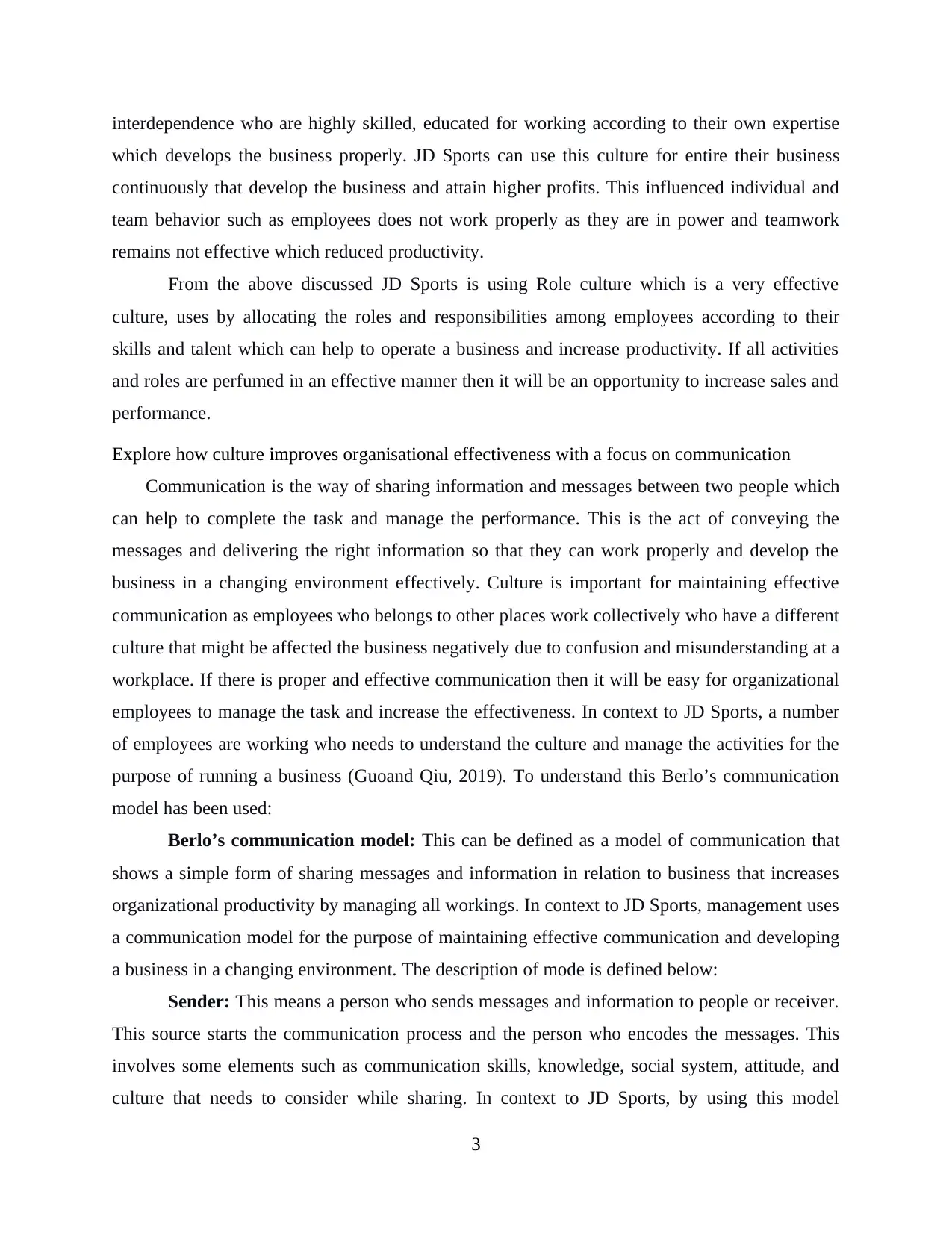
interdependence who are highly skilled, educated for working according to their own expertise
which develops the business properly. JD Sports can use this culture for entire their business
continuously that develop the business and attain higher profits. This influenced individual and
team behavior such as employees does not work properly as they are in power and teamwork
remains not effective which reduced productivity.
From the above discussed JD Sports is using Role culture which is a very effective
culture, uses by allocating the roles and responsibilities among employees according to their
skills and talent which can help to operate a business and increase productivity. If all activities
and roles are perfumed in an effective manner then it will be an opportunity to increase sales and
performance.
Explore how culture improves organisational effectiveness with a focus on communication
Communication is the way of sharing information and messages between two people which
can help to complete the task and manage the performance. This is the act of conveying the
messages and delivering the right information so that they can work properly and develop the
business in a changing environment effectively. Culture is important for maintaining effective
communication as employees who belongs to other places work collectively who have a different
culture that might be affected the business negatively due to confusion and misunderstanding at a
workplace. If there is proper and effective communication then it will be easy for organizational
employees to manage the task and increase the effectiveness. In context to JD Sports, a number
of employees are working who needs to understand the culture and manage the activities for the
purpose of running a business (Guoand Qiu, 2019). To understand this Berlo’s communication
model has been used:
Berlo’s communication model: This can be defined as a model of communication that
shows a simple form of sharing messages and information in relation to business that increases
organizational productivity by managing all workings. In context to JD Sports, management uses
a communication model for the purpose of maintaining effective communication and developing
a business in a changing environment. The description of mode is defined below:
Sender: This means a person who sends messages and information to people or receiver.
This source starts the communication process and the person who encodes the messages. This
involves some elements such as communication skills, knowledge, social system, attitude, and
culture that needs to consider while sharing. In context to JD Sports, by using this model
3
which develops the business properly. JD Sports can use this culture for entire their business
continuously that develop the business and attain higher profits. This influenced individual and
team behavior such as employees does not work properly as they are in power and teamwork
remains not effective which reduced productivity.
From the above discussed JD Sports is using Role culture which is a very effective
culture, uses by allocating the roles and responsibilities among employees according to their
skills and talent which can help to operate a business and increase productivity. If all activities
and roles are perfumed in an effective manner then it will be an opportunity to increase sales and
performance.
Explore how culture improves organisational effectiveness with a focus on communication
Communication is the way of sharing information and messages between two people which
can help to complete the task and manage the performance. This is the act of conveying the
messages and delivering the right information so that they can work properly and develop the
business in a changing environment effectively. Culture is important for maintaining effective
communication as employees who belongs to other places work collectively who have a different
culture that might be affected the business negatively due to confusion and misunderstanding at a
workplace. If there is proper and effective communication then it will be easy for organizational
employees to manage the task and increase the effectiveness. In context to JD Sports, a number
of employees are working who needs to understand the culture and manage the activities for the
purpose of running a business (Guoand Qiu, 2019). To understand this Berlo’s communication
model has been used:
Berlo’s communication model: This can be defined as a model of communication that
shows a simple form of sharing messages and information in relation to business that increases
organizational productivity by managing all workings. In context to JD Sports, management uses
a communication model for the purpose of maintaining effective communication and developing
a business in a changing environment. The description of mode is defined below:
Sender: This means a person who sends messages and information to people or receiver.
This source starts the communication process and the person who encodes the messages. This
involves some elements such as communication skills, knowledge, social system, attitude, and
culture that needs to consider while sharing. In context to JD Sports, by using this model
3
⊘ This is a preview!⊘
Do you want full access?
Subscribe today to unlock all pages.

Trusted by 1+ million students worldwide
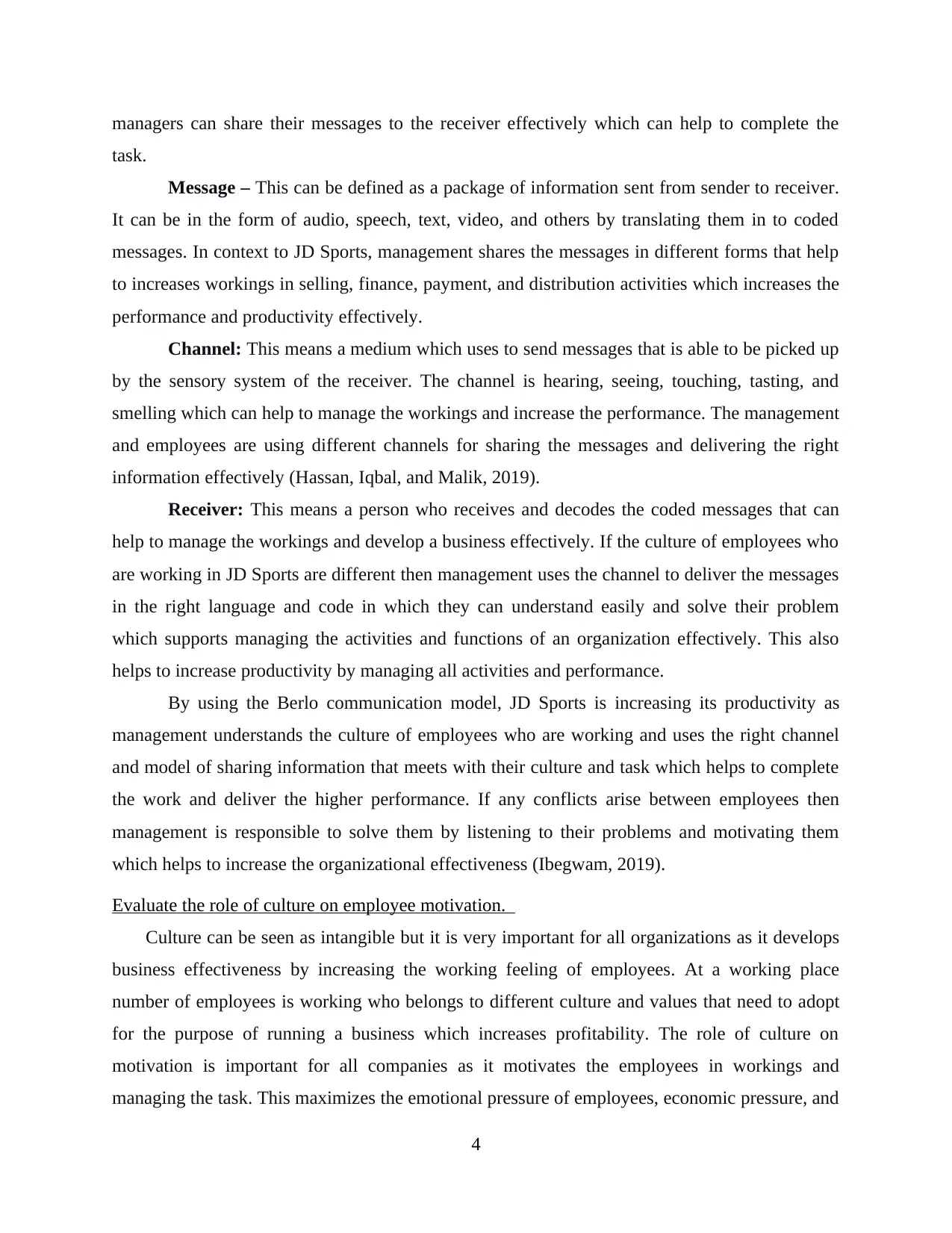
managers can share their messages to the receiver effectively which can help to complete the
task.
Message – This can be defined as a package of information sent from sender to receiver.
It can be in the form of audio, speech, text, video, and others by translating them in to coded
messages. In context to JD Sports, management shares the messages in different forms that help
to increases workings in selling, finance, payment, and distribution activities which increases the
performance and productivity effectively.
Channel: This means a medium which uses to send messages that is able to be picked up
by the sensory system of the receiver. The channel is hearing, seeing, touching, tasting, and
smelling which can help to manage the workings and increase the performance. The management
and employees are using different channels for sharing the messages and delivering the right
information effectively (Hassan, Iqbal, and Malik, 2019).
Receiver: This means a person who receives and decodes the coded messages that can
help to manage the workings and develop a business effectively. If the culture of employees who
are working in JD Sports are different then management uses the channel to deliver the messages
in the right language and code in which they can understand easily and solve their problem
which supports managing the activities and functions of an organization effectively. This also
helps to increase productivity by managing all activities and performance.
By using the Berlo communication model, JD Sports is increasing its productivity as
management understands the culture of employees who are working and uses the right channel
and model of sharing information that meets with their culture and task which helps to complete
the work and deliver the higher performance. If any conflicts arise between employees then
management is responsible to solve them by listening to their problems and motivating them
which helps to increase the organizational effectiveness (Ibegwam, 2019).
Evaluate the role of culture on employee motivation.
Culture can be seen as intangible but it is very important for all organizations as it develops
business effectiveness by increasing the working feeling of employees. At a working place
number of employees is working who belongs to different culture and values that need to adopt
for the purpose of running a business which increases profitability. The role of culture on
motivation is important for all companies as it motivates the employees in workings and
managing the task. This maximizes the emotional pressure of employees, economic pressure, and
4
task.
Message – This can be defined as a package of information sent from sender to receiver.
It can be in the form of audio, speech, text, video, and others by translating them in to coded
messages. In context to JD Sports, management shares the messages in different forms that help
to increases workings in selling, finance, payment, and distribution activities which increases the
performance and productivity effectively.
Channel: This means a medium which uses to send messages that is able to be picked up
by the sensory system of the receiver. The channel is hearing, seeing, touching, tasting, and
smelling which can help to manage the workings and increase the performance. The management
and employees are using different channels for sharing the messages and delivering the right
information effectively (Hassan, Iqbal, and Malik, 2019).
Receiver: This means a person who receives and decodes the coded messages that can
help to manage the workings and develop a business effectively. If the culture of employees who
are working in JD Sports are different then management uses the channel to deliver the messages
in the right language and code in which they can understand easily and solve their problem
which supports managing the activities and functions of an organization effectively. This also
helps to increase productivity by managing all activities and performance.
By using the Berlo communication model, JD Sports is increasing its productivity as
management understands the culture of employees who are working and uses the right channel
and model of sharing information that meets with their culture and task which helps to complete
the work and deliver the higher performance. If any conflicts arise between employees then
management is responsible to solve them by listening to their problems and motivating them
which helps to increase the organizational effectiveness (Ibegwam, 2019).
Evaluate the role of culture on employee motivation.
Culture can be seen as intangible but it is very important for all organizations as it develops
business effectiveness by increasing the working feeling of employees. At a working place
number of employees is working who belongs to different culture and values that need to adopt
for the purpose of running a business which increases profitability. The role of culture on
motivation is important for all companies as it motivates the employees in workings and
managing the task. This maximizes the emotional pressure of employees, economic pressure, and
4
Paraphrase This Document
Need a fresh take? Get an instant paraphrase of this document with our AI Paraphraser
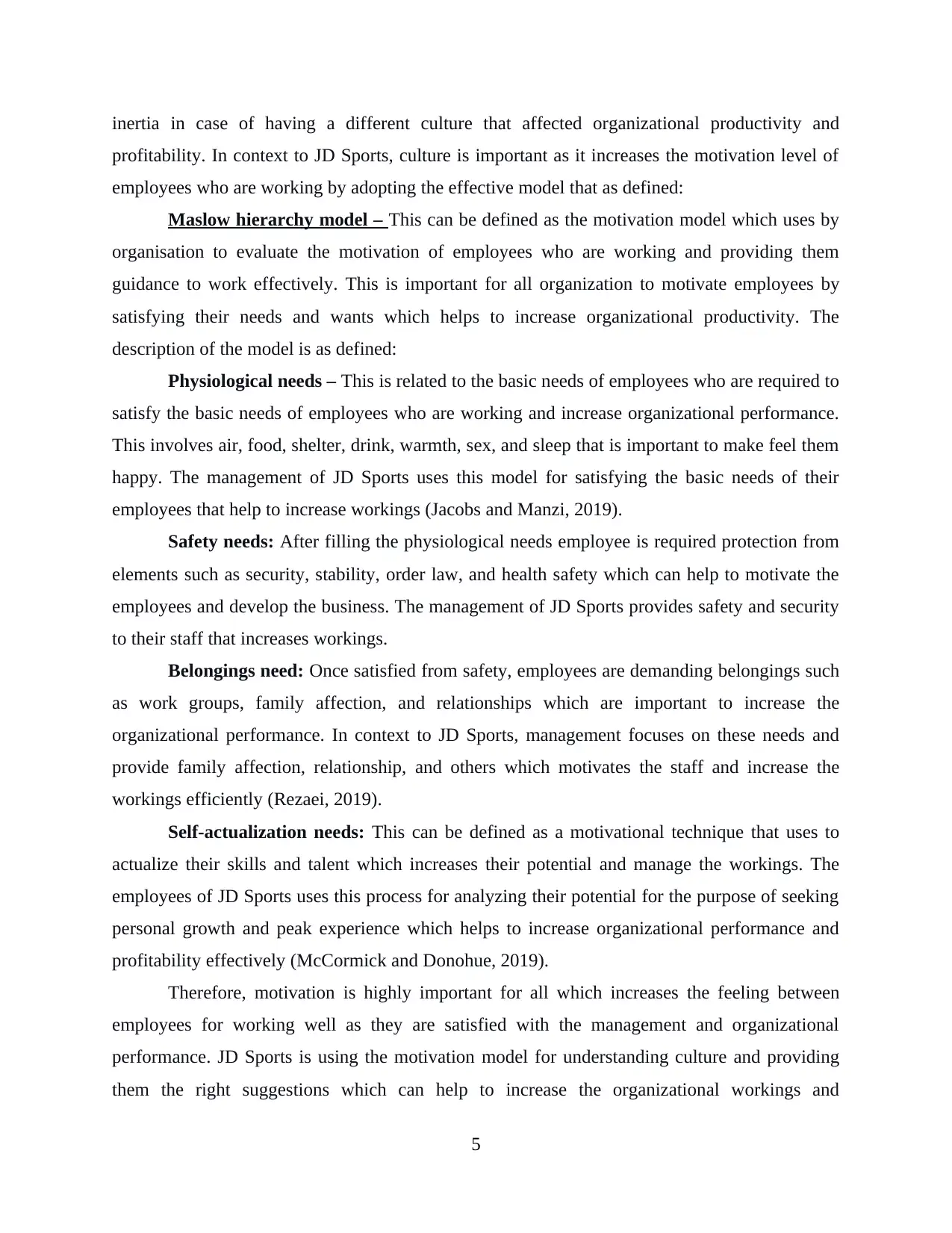
inertia in case of having a different culture that affected organizational productivity and
profitability. In context to JD Sports, culture is important as it increases the motivation level of
employees who are working by adopting the effective model that as defined:
Maslow hierarchy model – This can be defined as the motivation model which uses by
organisation to evaluate the motivation of employees who are working and providing them
guidance to work effectively. This is important for all organization to motivate employees by
satisfying their needs and wants which helps to increase organizational productivity. The
description of the model is as defined:
Physiological needs – This is related to the basic needs of employees who are required to
satisfy the basic needs of employees who are working and increase organizational performance.
This involves air, food, shelter, drink, warmth, sex, and sleep that is important to make feel them
happy. The management of JD Sports uses this model for satisfying the basic needs of their
employees that help to increase workings (Jacobs and Manzi, 2019).
Safety needs: After filling the physiological needs employee is required protection from
elements such as security, stability, order law, and health safety which can help to motivate the
employees and develop the business. The management of JD Sports provides safety and security
to their staff that increases workings.
Belongings need: Once satisfied from safety, employees are demanding belongings such
as work groups, family affection, and relationships which are important to increase the
organizational performance. In context to JD Sports, management focuses on these needs and
provide family affection, relationship, and others which motivates the staff and increase the
workings efficiently (Rezaei, 2019).
Self-actualization needs: This can be defined as a motivational technique that uses to
actualize their skills and talent which increases their potential and manage the workings. The
employees of JD Sports uses this process for analyzing their potential for the purpose of seeking
personal growth and peak experience which helps to increase organizational performance and
profitability effectively (McCormick and Donohue, 2019).
Therefore, motivation is highly important for all which increases the feeling between
employees for working well as they are satisfied with the management and organizational
performance. JD Sports is using the motivation model for understanding culture and providing
them the right suggestions which can help to increase the organizational workings and
5
profitability. In context to JD Sports, culture is important as it increases the motivation level of
employees who are working by adopting the effective model that as defined:
Maslow hierarchy model – This can be defined as the motivation model which uses by
organisation to evaluate the motivation of employees who are working and providing them
guidance to work effectively. This is important for all organization to motivate employees by
satisfying their needs and wants which helps to increase organizational productivity. The
description of the model is as defined:
Physiological needs – This is related to the basic needs of employees who are required to
satisfy the basic needs of employees who are working and increase organizational performance.
This involves air, food, shelter, drink, warmth, sex, and sleep that is important to make feel them
happy. The management of JD Sports uses this model for satisfying the basic needs of their
employees that help to increase workings (Jacobs and Manzi, 2019).
Safety needs: After filling the physiological needs employee is required protection from
elements such as security, stability, order law, and health safety which can help to motivate the
employees and develop the business. The management of JD Sports provides safety and security
to their staff that increases workings.
Belongings need: Once satisfied from safety, employees are demanding belongings such
as work groups, family affection, and relationships which are important to increase the
organizational performance. In context to JD Sports, management focuses on these needs and
provide family affection, relationship, and others which motivates the staff and increase the
workings efficiently (Rezaei, 2019).
Self-actualization needs: This can be defined as a motivational technique that uses to
actualize their skills and talent which increases their potential and manage the workings. The
employees of JD Sports uses this process for analyzing their potential for the purpose of seeking
personal growth and peak experience which helps to increase organizational performance and
profitability effectively (McCormick and Donohue, 2019).
Therefore, motivation is highly important for all which increases the feeling between
employees for working well as they are satisfied with the management and organizational
performance. JD Sports is using the motivation model for understanding culture and providing
them the right suggestions which can help to increase the organizational workings and
5
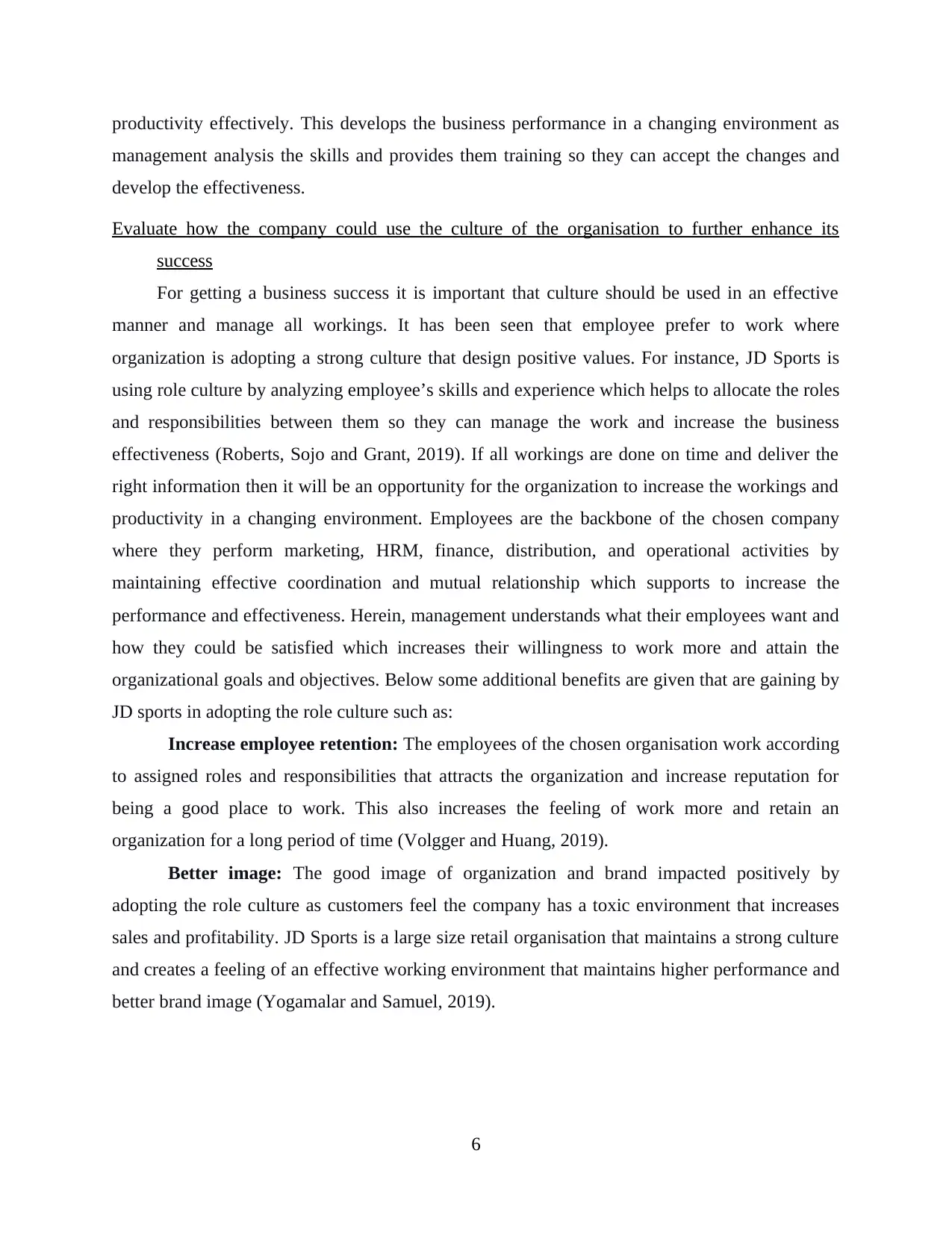
productivity effectively. This develops the business performance in a changing environment as
management analysis the skills and provides them training so they can accept the changes and
develop the effectiveness.
Evaluate how the company could use the culture of the organisation to further enhance its
success
For getting a business success it is important that culture should be used in an effective
manner and manage all workings. It has been seen that employee prefer to work where
organization is adopting a strong culture that design positive values. For instance, JD Sports is
using role culture by analyzing employee’s skills and experience which helps to allocate the roles
and responsibilities between them so they can manage the work and increase the business
effectiveness (Roberts, Sojo and Grant, 2019). If all workings are done on time and deliver the
right information then it will be an opportunity for the organization to increase the workings and
productivity in a changing environment. Employees are the backbone of the chosen company
where they perform marketing, HRM, finance, distribution, and operational activities by
maintaining effective coordination and mutual relationship which supports to increase the
performance and effectiveness. Herein, management understands what their employees want and
how they could be satisfied which increases their willingness to work more and attain the
organizational goals and objectives. Below some additional benefits are given that are gaining by
JD sports in adopting the role culture such as:
Increase employee retention: The employees of the chosen organisation work according
to assigned roles and responsibilities that attracts the organization and increase reputation for
being a good place to work. This also increases the feeling of work more and retain an
organization for a long period of time (Volgger and Huang, 2019).
Better image: The good image of organization and brand impacted positively by
adopting the role culture as customers feel the company has a toxic environment that increases
sales and profitability. JD Sports is a large size retail organisation that maintains a strong culture
and creates a feeling of an effective working environment that maintains higher performance and
better brand image (Yogamalar and Samuel, 2019).
6
management analysis the skills and provides them training so they can accept the changes and
develop the effectiveness.
Evaluate how the company could use the culture of the organisation to further enhance its
success
For getting a business success it is important that culture should be used in an effective
manner and manage all workings. It has been seen that employee prefer to work where
organization is adopting a strong culture that design positive values. For instance, JD Sports is
using role culture by analyzing employee’s skills and experience which helps to allocate the roles
and responsibilities between them so they can manage the work and increase the business
effectiveness (Roberts, Sojo and Grant, 2019). If all workings are done on time and deliver the
right information then it will be an opportunity for the organization to increase the workings and
productivity in a changing environment. Employees are the backbone of the chosen company
where they perform marketing, HRM, finance, distribution, and operational activities by
maintaining effective coordination and mutual relationship which supports to increase the
performance and effectiveness. Herein, management understands what their employees want and
how they could be satisfied which increases their willingness to work more and attain the
organizational goals and objectives. Below some additional benefits are given that are gaining by
JD sports in adopting the role culture such as:
Increase employee retention: The employees of the chosen organisation work according
to assigned roles and responsibilities that attracts the organization and increase reputation for
being a good place to work. This also increases the feeling of work more and retain an
organization for a long period of time (Volgger and Huang, 2019).
Better image: The good image of organization and brand impacted positively by
adopting the role culture as customers feel the company has a toxic environment that increases
sales and profitability. JD Sports is a large size retail organisation that maintains a strong culture
and creates a feeling of an effective working environment that maintains higher performance and
better brand image (Yogamalar and Samuel, 2019).
6
⊘ This is a preview!⊘
Do you want full access?
Subscribe today to unlock all pages.

Trusted by 1+ million students worldwide
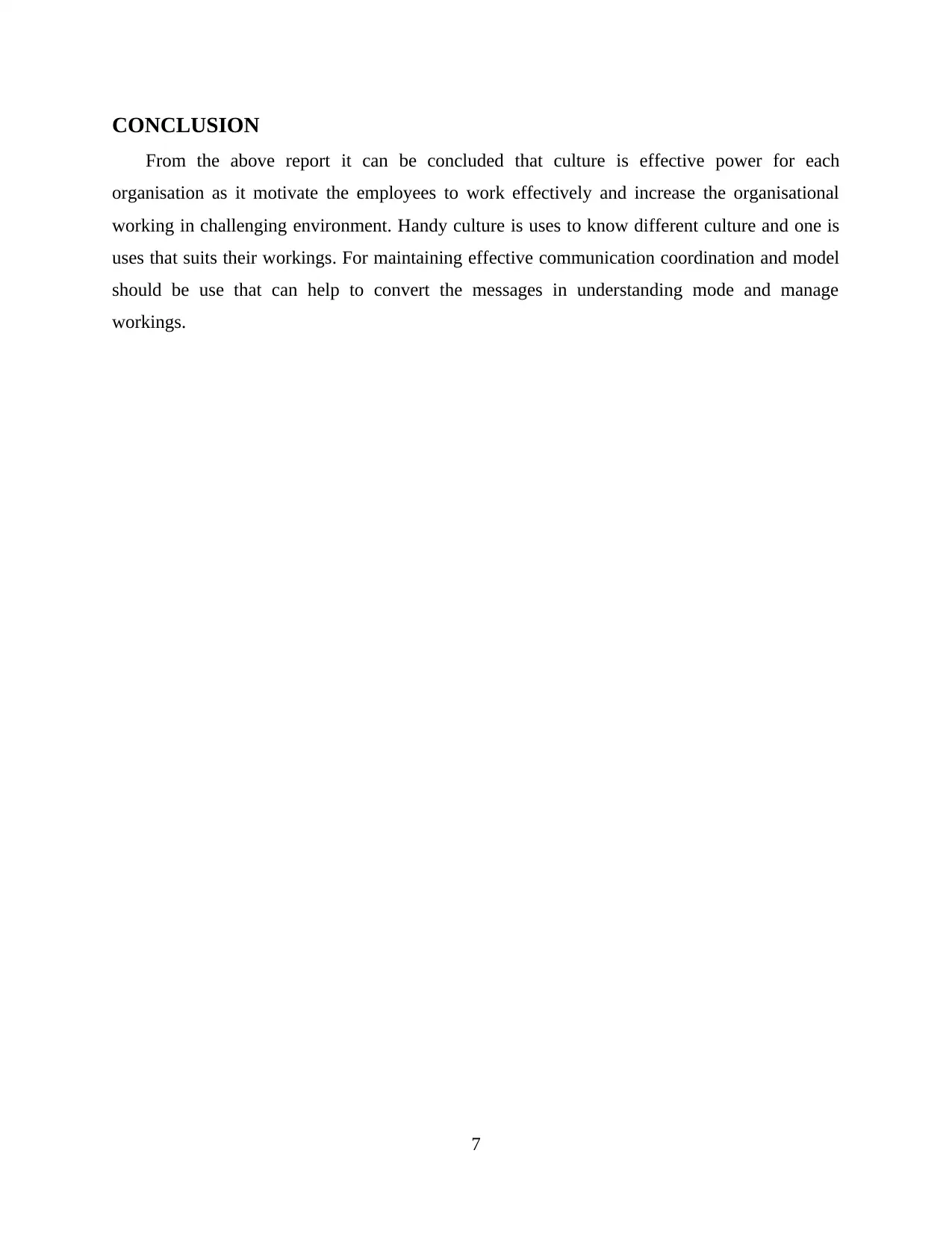
CONCLUSION
From the above report it can be concluded that culture is effective power for each
organisation as it motivate the employees to work effectively and increase the organisational
working in challenging environment. Handy culture is uses to know different culture and one is
uses that suits their workings. For maintaining effective communication coordination and model
should be use that can help to convert the messages in understanding mode and manage
workings.
7
From the above report it can be concluded that culture is effective power for each
organisation as it motivate the employees to work effectively and increase the organisational
working in challenging environment. Handy culture is uses to know different culture and one is
uses that suits their workings. For maintaining effective communication coordination and model
should be use that can help to convert the messages in understanding mode and manage
workings.
7
Paraphrase This Document
Need a fresh take? Get an instant paraphrase of this document with our AI Paraphraser
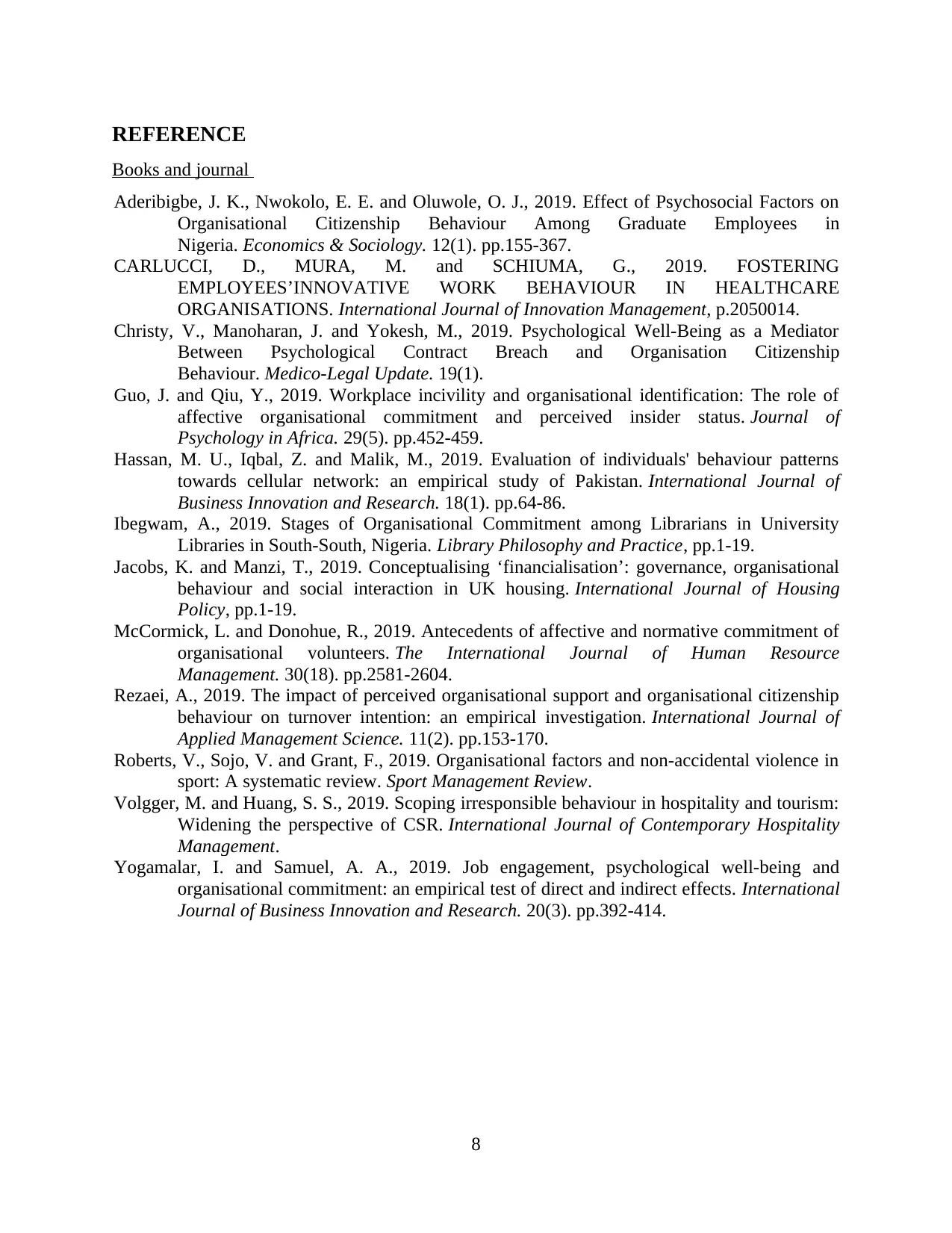
REFERENCE
Books and journal
Aderibigbe, J. K., Nwokolo, E. E. and Oluwole, O. J., 2019. Effect of Psychosocial Factors on
Organisational Citizenship Behaviour Among Graduate Employees in
Nigeria. Economics & Sociology. 12(1). pp.155-367.
CARLUCCI, D., MURA, M. and SCHIUMA, G., 2019. FOSTERING
EMPLOYEES’INNOVATIVE WORK BEHAVIOUR IN HEALTHCARE
ORGANISATIONS. International Journal of Innovation Management, p.2050014.
Christy, V., Manoharan, J. and Yokesh, M., 2019. Psychological Well-Being as a Mediator
Between Psychological Contract Breach and Organisation Citizenship
Behaviour. Medico-Legal Update. 19(1).
Guo, J. and Qiu, Y., 2019. Workplace incivility and organisational identification: The role of
affective organisational commitment and perceived insider status. Journal of
Psychology in Africa. 29(5). pp.452-459.
Hassan, M. U., Iqbal, Z. and Malik, M., 2019. Evaluation of individuals' behaviour patterns
towards cellular network: an empirical study of Pakistan. International Journal of
Business Innovation and Research. 18(1). pp.64-86.
Ibegwam, A., 2019. Stages of Organisational Commitment among Librarians in University
Libraries in South-South, Nigeria. Library Philosophy and Practice, pp.1-19.
Jacobs, K. and Manzi, T., 2019. Conceptualising ‘financialisation’: governance, organisational
behaviour and social interaction in UK housing. International Journal of Housing
Policy, pp.1-19.
McCormick, L. and Donohue, R., 2019. Antecedents of affective and normative commitment of
organisational volunteers. The International Journal of Human Resource
Management. 30(18). pp.2581-2604.
Rezaei, A., 2019. The impact of perceived organisational support and organisational citizenship
behaviour on turnover intention: an empirical investigation. International Journal of
Applied Management Science. 11(2). pp.153-170.
Roberts, V., Sojo, V. and Grant, F., 2019. Organisational factors and non-accidental violence in
sport: A systematic review. Sport Management Review.
Volgger, M. and Huang, S. S., 2019. Scoping irresponsible behaviour in hospitality and tourism:
Widening the perspective of CSR. International Journal of Contemporary Hospitality
Management.
Yogamalar, I. and Samuel, A. A., 2019. Job engagement, psychological well-being and
organisational commitment: an empirical test of direct and indirect effects. International
Journal of Business Innovation and Research. 20(3). pp.392-414.
8
Books and journal
Aderibigbe, J. K., Nwokolo, E. E. and Oluwole, O. J., 2019. Effect of Psychosocial Factors on
Organisational Citizenship Behaviour Among Graduate Employees in
Nigeria. Economics & Sociology. 12(1). pp.155-367.
CARLUCCI, D., MURA, M. and SCHIUMA, G., 2019. FOSTERING
EMPLOYEES’INNOVATIVE WORK BEHAVIOUR IN HEALTHCARE
ORGANISATIONS. International Journal of Innovation Management, p.2050014.
Christy, V., Manoharan, J. and Yokesh, M., 2019. Psychological Well-Being as a Mediator
Between Psychological Contract Breach and Organisation Citizenship
Behaviour. Medico-Legal Update. 19(1).
Guo, J. and Qiu, Y., 2019. Workplace incivility and organisational identification: The role of
affective organisational commitment and perceived insider status. Journal of
Psychology in Africa. 29(5). pp.452-459.
Hassan, M. U., Iqbal, Z. and Malik, M., 2019. Evaluation of individuals' behaviour patterns
towards cellular network: an empirical study of Pakistan. International Journal of
Business Innovation and Research. 18(1). pp.64-86.
Ibegwam, A., 2019. Stages of Organisational Commitment among Librarians in University
Libraries in South-South, Nigeria. Library Philosophy and Practice, pp.1-19.
Jacobs, K. and Manzi, T., 2019. Conceptualising ‘financialisation’: governance, organisational
behaviour and social interaction in UK housing. International Journal of Housing
Policy, pp.1-19.
McCormick, L. and Donohue, R., 2019. Antecedents of affective and normative commitment of
organisational volunteers. The International Journal of Human Resource
Management. 30(18). pp.2581-2604.
Rezaei, A., 2019. The impact of perceived organisational support and organisational citizenship
behaviour on turnover intention: an empirical investigation. International Journal of
Applied Management Science. 11(2). pp.153-170.
Roberts, V., Sojo, V. and Grant, F., 2019. Organisational factors and non-accidental violence in
sport: A systematic review. Sport Management Review.
Volgger, M. and Huang, S. S., 2019. Scoping irresponsible behaviour in hospitality and tourism:
Widening the perspective of CSR. International Journal of Contemporary Hospitality
Management.
Yogamalar, I. and Samuel, A. A., 2019. Job engagement, psychological well-being and
organisational commitment: an empirical test of direct and indirect effects. International
Journal of Business Innovation and Research. 20(3). pp.392-414.
8
1 out of 11
Related Documents
Your All-in-One AI-Powered Toolkit for Academic Success.
+13062052269
info@desklib.com
Available 24*7 on WhatsApp / Email
![[object Object]](/_next/static/media/star-bottom.7253800d.svg)
Unlock your academic potential
Copyright © 2020–2026 A2Z Services. All Rights Reserved. Developed and managed by ZUCOL.





